副词详细讲解课件
形容词和副词公开课PPT课件

与形容词类似,副词也有比较级和最高级形式,需注意正 确使用。例如,“更快”而非“快er”,“最慢”而非 “慢est”。
避免常见误区和注意事项
避免过度使用形容词和副词
过多的形容词和副词会使句子显得累赘,影响表达效果。应力求 简洁明了,仅在必要时使用。
注意语境和表达习惯
形容词和副词的使用需根据具体语境和表达习惯进行调整,避免生 搬硬套。
04
形容词和副词在句子中运用
形容词在句子中位置和作用
01 形容词定义
描述名词或代词性质、状态或特征的词。
02 形容词在句子中的位置
通常位于名词前,如“美丽的花园”中的“美丽 ”。
03 形容词的作用
使句子更加生动形象,帮助读者或听者更好地理 解和想象所描述的事物。
副词在句子中位置和作用
副词定义
修饰动词、形容词、其他 副词或整个句子的词。
形容词分类及举例
品质形容词
描述人或事物的品质或特 征,如“美丽的”、“善 良的”。
数量形容词
描述人或事物的数量或程 度,如“许多”、“一些 ”。
指示形容词
用来指示特定的人或事物 ,如“这个”、“那个” 。
疑问形容词
用来引导疑问句,询问人 或事物的性质、特征或状 态,如“什么样的”、“ 怎样的”。
常见易混淆形容词辨析
• 比较级
单音节词和部分双音节词 通过加-er和-est构成比较 级和最高级;多音节词和 部分双音节词通过加more 和most构成比较级和最高 级。
John is taller than Tom. (约翰比汤姆高。)
05 • 最高级
Of all the students in the class, Mary studies the hardest.(在班上所有学生 中,玛丽学习最努力。)
形容词副词ppt

A. so well
B. so good
C. well enough
D. goபைடு நூலகம்d enough
8.we decided not to climb the mountains
because it was raining __D__.
A. badly
B. hardly
C. strongly D. heavily
9.John was so sleepy that he could hardly keep his eyes _A___.
A. open
B. to be opened
C. to open D. opening 10.(02北京) It was raining heavily. Little Mary felt cold, so she stood __A___ to her mother.
the meeting __C__ Chris, who’s usually ten
minutes late for everything.
A. but B. only C. even D. yet
18.(NMET2004广东) It is __D__ any
wonder that his friend doesn’t like watching television much.
B. very
C. quickly
D. largely
25.(NMET2003全国) Alien had to call a taxi because the box was __A__ to carry all the way home.
A. much too heavy
副词-专升本英语语法详细讲解课件

Have you been there already?
③做“还”讲时, yet用于否定句, still用于肯定 句、疑问句, 表示“依然、继续”, 有时也用于 否定句。
The rain hasn’t stopped yet.
It’s still raining now.
四.同源副词
A)
5.I used to smoke _______ but I gave it up three years ago.
A) seriously B) heavily C) badly D) severely
B)
6.The organization had broken no rules, but _____ had it acted responsibly. A) neither B) so
A) essentially B) completely C) necessarily D) remarkably
A)
3.Our journey was slow because the train stopped ________ at different villages.
A) unceasingly B) gradually C) continuously D) continually
4.so, neither与nor
三个词都能表示后者和前者情况相似。 so用于肯定句, neither和nor用于否定 句。
①He likes skating. So do I. ②The first one wasn't good, and
neither/nor was the second.
2. late, lately late意思是“晚”, lately意思为“近来” You have come too late. Have you see him lately?
副词讲解PPT课件

fastest hardest longest soonest
later
latest
earlier earliest
21
不规则变化
-
22
形容词和副词的原级、比较级和
最高级的用法:
• (1)讲述某人/物自身的情况时,用原级。基本句 型是:
• 主语(sb./sth) + 谓语动词 +(very/too/so/quite/rather…) + 形容词/副 词原级 +….
•
主语(第一个人物) + 谓语动词 + as +
形容词/副词原级 + as + 第二个人物 +….
•
如:He is as excited as his
younger sister.(他和他妹妹一样兴奋)
• / Lily rode her bike as slowly as an old lady.(莉莉骑车像老太太一样慢)
• 如:He is very old now.(他现在很老了)
• / They ran quite fast.(它们跑得相当快)
• / The weather looks rather bad.(天气看上
去相当糟)
• / I am so happy!(我是如此的快乐)
•
-
23
• ☆表示两者之间没有差别时,使用句型:
①原级;②比较级;③最高级。
构成方法
原级
单
音 节
一般在词尾加-er或-
fast hard
词
long
和 est
soon
少
数 双
以字母e结尾的副词,late
英语副词ppt课件精选全文完整版
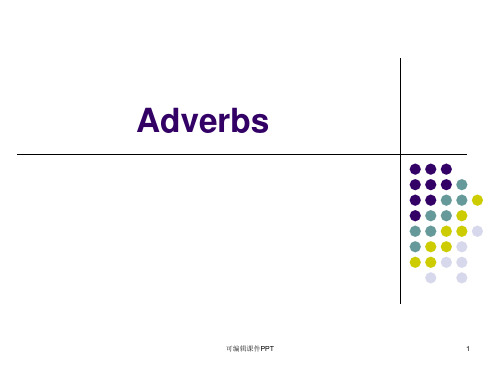
可编辑课件PPT
21
副词的比较等级构成
单音节和个别双音节副词通过加后-er ,-est 构成比较级和最高级。 high higher highest fast faster fastest
绝大多数副词借助more ,most 构成比较级和最高级 clearly more clearly most clearly easily more easily most easily slowly more slowly most slowly
可编辑课件PPT
19
副词的排列次序 ——练习题1
A: ________________ . B: So did I.
B
A. I saw her last Sunday at the party B. I saw her at the party last Sunday C. At the party I saw her last Sunday D. At the party last Sunday I saw her
Adverbs
可编辑课件PPT
1
Outline
1. 副词的构成 2. 副词的分类 3. 副词的功能 4. 副词的位置 5. 副词的排列顺序 6. 副词的比较等级 7. 易混淆副词 8. 练习题 9. Homework
可编辑课件PPT
2
副词的构成
一、大部分副词由相应的形容词加后缀 -ly构成,但注意有变化: happy—happily subtle—subtly true—truly loose—loosely democratic—democratically public—publicly dull—dully
副词的排列次序
1. 地点副词→时间副词 方式副词→时间副词 方式副词→地点副词→时间副词 (有时,时间副词亦可放在句首)
副词的讲解
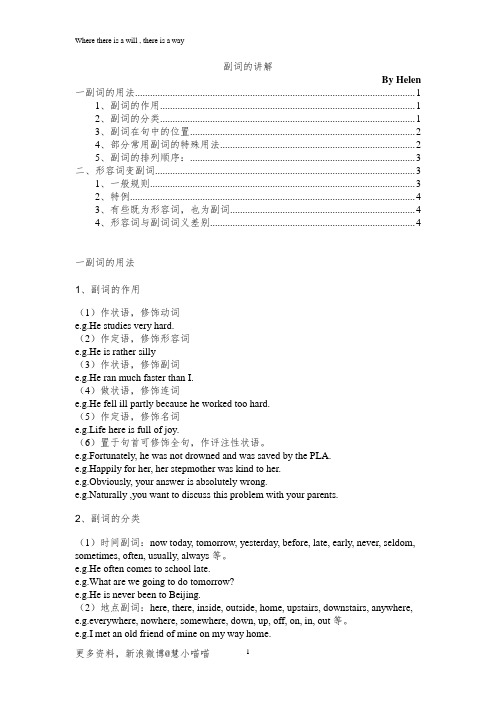
副词的讲解By Helen 一副词的用法 (1)1、副词的作用 (1)2、副词的分类 (1)3、副词在句中的位置 (2)4、部分常用副词的特殊用法 (2)5、副词的排列顺序: (3)二、形容词变副词 (3)1、一般规则 (3)2、特例 (4)3、有些既为形容词,也为副词 (4)4、形容词与副词词义差别 (4)一副词的用法1、副词的作用(1)作状语,修饰动词e.g.He studies very hard.(2)作定语,修饰形容词e.g.He is rather silly(3)作状语,修饰副词e.g.He ran much faster than I.(4)做状语,修饰连词e.g.He fell ill partly because he worked too hard.(5)作定语,修饰名词e.g.Life here is full of joy.(6)置于句首可修饰全句,作评注性状语。
e.g.Fortunately, he was not drowned and was saved by the PLA.e.g.Happily for her, her stepmother was kind to her.e.g.Obviously, your answer is absolutely wrong.e.g.Naturally ,you want to discuss this problem with your parents.2、副词的分类(1)时间副词:now today, tomorrow, yesterday, before, late, early, never, seldom, sometimes, often, usually, always等。
e.g.He often comes to school late.e.g.What are we going to do tomorrow?e.g.He is never been to Beijing.(2)地点副词:here, there, inside, outside, home, upstairs, downstairs, anywhere, e.g.everywhere, nowhere, somewhere, down, up, off, on, in, out等。
频度副词完整版PPT课件
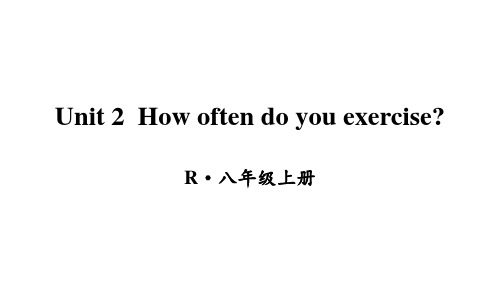
你多久看一次电视? ——twice a week.一个星期两次。
【中考对接】
(浙江温州中考)
— How often do you go skating?
— ______, I can’t skate at all.
A. always
B. hardly
C. usually
D. often
My brother exercises_____a day, in the morning and in the evening.
A. once
B.twice
C. o度副词的概念。
2.频度副词的用法。
我一个星期洗三次头发。
twice week once a month
three times year four times
3.表示不具体频度的词。 英语中还有一些频度副词不表示具体的频率、次数。如
always总是,> usually通常,>often经常,>sometimes有时,> seldom很少,> hardly ever几乎不 ,>never从不。
Sometimes I get up early. 我有时起得早。
2.表示具体的频率、次数时,一次用once,两次用twice ,三次以上用“基数词+times”。
例:Amy goes to the cinema once a month. 艾米一个月去一次电影院。
I wash my hair three times a week.
A.Always
B. Sometimes
副词完整ppt课件

• (3)表示三者或三者以上的比较,用最高级。
• He runs(the)fastest in his class.在他班上他跑得最快。
• She jumps(the)farthest of the girls.在那些女孩中,她跳得最
远。
• 5.副词的比较级和最高级的构成
•
与形容词比较级构成的规则相同。
• 2.There are a _fe_w______ (few, little ) eggs in the box.
• 3.He speaks English __fa_s_t____ (slow, fast). • 4.I can't read this word,t_o_o______ (either, too). • 5.He plays tennis __w_e_ll____ (good, well).
• as 变than
.
整理版课件
11
4 Nowadays, all the children live happy.
• happy 变happily
.
5 Linda’s box is heaviest of the three. Let’s
help her.
• heaviest 前加the
.
整理版课件
12
照例句改写句子
• A:The book is new.
This is a new book
• 1.That woman is thin.
• 2.That clock is new.
• 3.Those bikes are cold.
• 4.This apple is big.
• 5.These babies are lovely.
形容词副词ppt

4.(NMET2004上海春) I have worked with him for some time and have found that he is __B_ than John.
A. more efficiency a worker B. a more efficient worker C. more an efficient worker D. a worker more efficiently
• 只用作表语的形容词:well, ill, content, due, fond, glad, likely, ready, sorry, sure
He is likely to see me today. This is a possible solution. The boy is ill/sick. The sick boy is lying in bed. ill news, ill wind, ill luck
wooden) 5.He has a lovely red woollen jumper. (woollen, lovely, red) 6.She has a fabulous new diamond ring. (diamond,new,
fabulous) 7.It was a lovely old French song.(French,old, lovely) 8.He owns a horrible big black dog.(black,horrible,big)
Opshacom
• 请根据形容词排列规则完成以下练习:
1.She has a ___ jacket.(leather,brown,beautiful) 2.He has a ___ car. (American,long,red) 3.They live in a ___ house. (old,beautiful) 4.We have a ___ table. (antique, small,wooden) 5.He has a ___ jumper. (woollen, lovely, red) 6.She has a ___ ring. (diamond,new,fabulous) 7.It was a ___ song.(French,old, lovely) 8.He owns a ___ dog.(black,horrible,big) 9.She bought a ___ scarf.(gorgeous,silk,pink) 10.I saw a ___ film. (new,fantastic, British)
初中语文 七年级下学期语法知识 《 副词 》 课件(22张PPT)
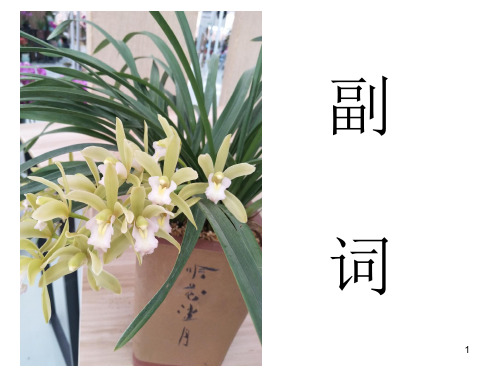
4
1)李先生有一份记录真详细,里面记录了公司
半年的收支情况。答案:名词 Nhomakorabea动词2)报告!我的报告已经做好了,请首长过目。
答案 :动词 名词
3)我们冒着危险,攀过最危险的山崖,最后才找
到下山的路。
答案 :名词 形容词
4)爸爸常常教训我要做一个好人,我要紧记他的
答案 :动词 名词
6
虚词(一) 副词
7
一、副词的定义
用来修饰动词或形容词,表示 它们的时间、频率、程度、范 围、重复、语气、肯定、否定 等意义的词。
8
二、副词的种类
1、表示时间、频率:已经 曾经 刚才 正在 就 将要 快要 马上 立刻 顿时 渐渐 终于 忽然 偶尔 常常 时常 永远 永久 一直 一向 一再 再三 屡次
12
四、怎样区别副词与形容词
副词、形容词都可以修饰动词或形容词作状 语,这就容易混淆,可从下列四个方面去辨别:
(1)形容词能修饰名词,副词不能。
例:“一致”可以修饰“意见”,“一律”则不能; 可以说“突然的想法”,不能说“忽然的想法”“居 然的想法”。
(2)看能否受“很”字修饰。形容词能受“很”字 修饰,副词则不能。可以说“很突然”,不能说 “很居然”。
教训。
答案 :动词 名词
5)我会爱我的母亲,直到永远。
答案 : 名词
5
6) 他是我们单位的领导,在他的领导之下,我 们这个月的工作效率大大提高了。
答案 :名词 动词
7) 气温很低,只有零下五度,游击队员化整为零, 进入山区暂避寒冬。 答案 :数词 名词
8) 你以后不要挂念我,也不要奢望我对你的挂念。
形容词和副词英语语法讲解PPT

• 4.与定冠词一起表示某一类人或物, 如: • The rich and the poor live very different lives . • 5.作状语,表示伴随、原因、结果等。如: • He went to bed , cold and hungry .
二、副词
• (一)副词的作用 • 1.作状语,修饰动词、形容词、副词或整 个句子。如: • He had worked hard all his life .(修饰动词) • He is very diligent.(修饰形容词) • You can find books on that subject quite easily .(修饰副词) • Luckily she was in when I called .(修饰句 子)
C. “enough”作定语时一般放在中心词前;但作 副词时只能后置。 We have enough food to eat. She is old enough to go to school. D. 以 a- 开头的形容词做定语要后置。如:alike, alive, alone, asleep, afraid, awake… 如:He is the only man awake at that time. E. 某些形容词,如: present (在场的,出席的), involved(有关的), concerned (相关的), left (剩下 的), mentioned (提及的), selected (当选的)等。 如: the students present (出席的学生) the cost involved (所需费用)
beautifully She is always dressed ____________. 2. 形容词修饰名词;副词修饰形容词,副词和全句。 He has got a serious illness.(名词) He is seriously ill.(形容词) You can find books on that subject quite easily .(副词) Luckily she was in when I called.(句子)
初中英语知识点---副词精华讲解
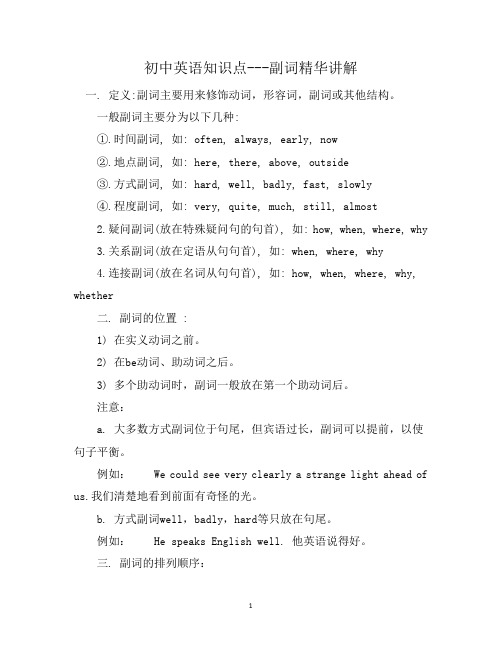
初中英语知识点---副词精华讲解一. 定义:副词主要用来修饰动词,形容词,副词或其他结构。
一般副词主要分为以下几种:①.时间副词, 如: often, always, early, now②.地点副词, 如: here, there, above, outside③.方式副词, 如: hard, well, badly, fast, slowly④.程度副词, 如: very, quite, much, still, almost2.疑问副词(放在特殊疑问句的句首), 如: how, when, where, why3.关系副词(放在定语从句句首), 如: when, where, why4.连接副词(放在名词从句句首), 如: how, when, where, why, whether二. 副词的位置 :1) 在实义动词之前。
2) 在be动词、助动词之后。
3) 多个助动词时,副词一般放在第一个助动词后。
注意:a. 大多数方式副词位于句尾,但宾语过长,副词可以提前,以使句子平衡。
例如:We could see very clearly a strange light ahead of us.我们清楚地看到前面有奇怪的光。
b. 方式副词well,badly,hard等只放在句尾。
例如:He speaks English well. 他英语说得好。
三. 副词的排列顺序:1) 时间,地点副词,小单位的在前,大单位在后。
2) 方式副词,短的在前,长的在后,并用and或but等连词连接。
例如:Please write slowly and carefully. 请写得慢一些,仔细一些3) 多个不同副词排列:程度+地点+方式+时间副词。
注意:副词very 可以修饰形容词,但不能修饰动词。
改错:(错) I very like English. (对) I like English very much.注意:副词enough要放在形容词的后面,形容词enough放在名词前后都可。
副词详细讲解课件
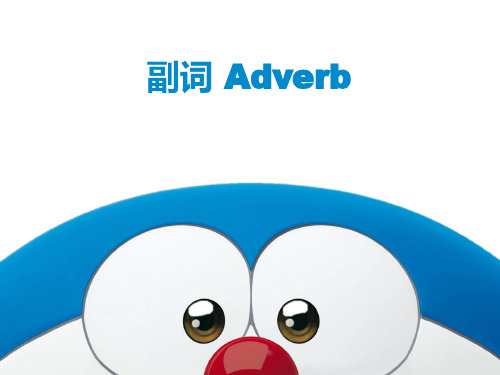
四、副词构成
(1)一般是在形容词之直接加-ly:
really sad______; sadly certain_______; certainly real______;
(2) 形容词以辅音字母结尾加y 结尾的变y为i, 再加 -ly:
hungrily ; angry______; angrily easy_______ easily hungry_____
副词 Adverb
一、定义
副词(Adverb 简称adv.)是指在 句子中表示行为或状态特征的词, 用以修饰动词、形容词、其他副 词或全句,表示时间、地点、程 度、方式等概念。副词可分为: 时间副词、地点副词、频率副词、 方式副词、程度副词、疑问副词、 连接副词、关系副词。
二、分类
1)时间副词, 常用的有:ago,before, then, soon, already,yet等 2)地点副词, 常用的有:here,there,above, below,inside,outside 3)疑问副词, 常见的有: where,when,why, how 4)程度副词,常见的有:very,much,so,too, quite,enough 5)方式副词,多由形容后加ly构成: carefully, quickly,slowly, easily,quietly,hurriedly, 6)频度副词, 常用的有:always,often,sometimes. usually, hardlywhen, why
This is the village where I was born. Is that the reason why you don’t take the exam?
1、主要用作状语,可用来修饰动词,形容词,副词和句子。 1.动词
副词的区别语法讲解

副词的区别语法讲解
嘿,朋友们!今天咱来聊聊副词的区别这档子事儿。
咱就说啊,副词就像是语言里的小精灵,能给句子增添各种奇妙的色彩和味道。
比如说“快”和“赶快”,听起来好像差不多,但用起来可就有点不一样啦!你说“他跑得很快”,那就是单纯说他速度快;可要是说“他赶快跑”,这就有一种紧迫感,好像有啥着急事儿赶着他跑似的。
这就好比跑步比赛,“快”是正常发挥,“赶快”就是冲刺阶段!
再看看“非常”和“十分”,这俩家伙也是各有特点。
“他非常优秀”强调的是程度很高;“他十分出色”呢,给人感觉更全面、更彻底。
就好像吃蛋糕,“非常”是那浓郁的巧克力味,“十分”就是整个蛋糕的美味综合。
还有“刚刚”和“刚才”,别小看这一字之差啊!“我刚刚吃完”,说的是就在刚才那个瞬间;“我刚才吃了”,重点是在刚才那个时间段。
这就像拍照,“刚刚”是抓拍瞬间,“刚才”是记录那段时间的场景。
咱平时说话可得把这些副词用对了,不然意思可能就差老远啦!就像走路,走对了路才能到达目的地,用对了副词才能准确表达咱的意思呀。
你想想,要是把“他轻轻地走过来”说成“他重重地走过来”,那感觉能一样吗?一个像微风拂面,一个像大象跺脚!又或者把“她特别开心”说成“她有点开心”,那开心的程度可就大打折扣咯。
所以说啊,副词虽小,作用可大着呢!它们就像生活中的调料,能让我们的语言变得丰富多彩,有滋有味。
咱可得好好琢磨琢磨这些小精灵,让它们为我们的表达增光添彩。
总之,副词的区别可不能小瞧,它们能让我们的话更生动、更准确。
大家平时说话写作的时候,多留意留意这些小家伙,让它们乖乖听话,为我们服务,那咱的语言不就更上一层楼啦!。
- 1、下载文档前请自行甄别文档内容的完整性,平台不提供额外的编辑、内容补充、找答案等附加服务。
- 2、"仅部分预览"的文档,不可在线预览部分如存在完整性等问题,可反馈申请退款(可完整预览的文档不适用该条件!)。
- 3、如文档侵犯您的权益,请联系客服反馈,我们会尽快为您处理(人工客服工作时间:9:00-18:30)。
7. Is there _____ to discuss at the class meeting?
A. something important C. important something A.120 meters high C. 120-metres-high _____ hasn’t done it. B. anything important D. important anything B. 120-meter-high D. 120-metre high
certainly
(2) 形容词以辅音字母结尾加y 结尾的变y为i, 再加 -ly:
hungry_____ hungrily; angry______; angrily easy_______ easily
(3) 以e结尾的直接加-ly:
widely safely (truly除外*) wide_______; safe______ possibly gentle_______; gently possible________;
1. The scientist felt _____ when he saw so many people cheering his success. A. happy B. happily C. angrily D. angry 2. I haven’t seen her for a long time. I can _____ remember her mane. A. nearly B. almost C. hardly D. quite 3. The light music sounds very _____. I enjoy it very much. A. beautiful B. well C. boring D. wonderfully 4. Nowadays, more and more people do enough exercise to keep their ____ well. A. healthy B. health C. unhealthy D. healthily 5.The children are looking at these lovely dogs. A.happy B. happily C. happiness D. happier 6. The old woman can’t see the message on the mobile phone_____. A. clear enough B. enough clear C. clearly enough D. enough clearly
8. The newly built dormitory building is about _____.
9. Last week he promised to do the work at once, But he
A. yet
B. already
C. still
D. ever
10 Chinese food is quite______________American food. A. different from C. similar to B. the same as D. different to
1.Jane says that music isn’t as interesting as art.
Jane says that music is _____ interesting _____art. 2. Sam is taller than any other student in his class. Sam is _____ _____ student in his class. 3. Robert is so short that he can’t yet reach the pears
Peter很懒, 他早上几乎从不早起。
good 和 well 的区别:
1. good只能用作形容词. He is a good student.
I am good at English.
2. well 副词,形容词都可以。 well 副词:He did his homework well. well 形容词: 人的身体健康状况良好
3. She listens to me very carefully. 这里very放在副词carefully前,起到修饰副词的作用。
“hard”到底是形容词还是副词?
一. hard是形容词。
1. 困难的 (相当于difficult)
That question is very hard/difficult, I don't know how to answer it. (那道题很难,我不知道怎么解答) 2. 坚硬的。 The stone is very hard. 这块石头很硬。
1. Many experts think pigs are _____ to train than dogs or cats. A. easier B. much easy C. more easily D. too easy 2.An underground train doesn’t run as _____ as a maglev(磁悬浮列 车). A. faster B. fast C. fastest D. much faster 3. James Watt was one of _____ scientists at that time. A. great B. greater C. greatest D. the greatest 4. Of the two pairs of jeans, I chose ____ one because I hadn’t enough money on me. A. expensive B. more expensive C. less expensive D. the most expensive 5. The Mars is far ______ to us than the Pluto(冥王星). We wish we could live on it one day. A. close B. closer C. closest D. the closest 6. Mr. Smith thought the Century Park was the second ______ in Shanghai. A. large B. larger C. largest D. very large
(4) 以e结尾的去e加——y: (5) 形容词和副词同形的:
early fast 快的/地_________; 早的/地_________; late 晚的/地________
"-ly"副词的用法
1. Please listen to me carefully. 副词用来修饰动词,形容词或副词。 2. She is a very good girl. 在这里very是副词,放在形容词good前面,修饰形容 词.
3
4
方式副词
程度副词
hard, well, fast, slowly, excitedly, really
almost, nearly, very, fairly, quite, rather
二、分类
always, often, frequently, seldom, 频度副词 never 疑问副词 how, where, when, why
பைடு நூலகம்
5
6 7 8
how, when, where, why, whether, 连接副词 however, meanwhile
关系副词 when, where, why
三、构成
(1)一般是在形容词之直接加-ly:
real______; sad______; certain_______;
really
sadly
副词 Adverb
By Sunny
一、定义
用来说明事情发生的时间、地点、原因、方 式等含义或说明其它形容词或副词程度的词 叫做副词。
二、分类
1 2
时间副词 地点副词
soon, now, early, finally, once, recently here, nearby, outside, upwards, above
7. All of us are proud of the great changes in Shanghai. We’re sure Shanghai will be even ______ tomorrow. A. good B. better C. best D. the best 8.Which is ______, cotton, wood or iron? A. heavier B. heaviest C. the heaviest D. the most heavily 9.In my opinion, Tim doesn’t write English ______ his sister. A. as clear as B. so clear as C. more clearly as D. as clearly as 10.Remember, _______ you work, ______ result you will get. A. the better/the harder B. the harder/the better C. the more/the better D. the harder/the more good 11. We are too tired and hungry. So our steps are getting ______. A. slow and slower B. slower and slowest C. slower and slower D. more and more slowly 12. We must finish cleaning the office ___________. A. as soon as possible B. as quickly as soon C. as possible as soon D. as soon as possibly
